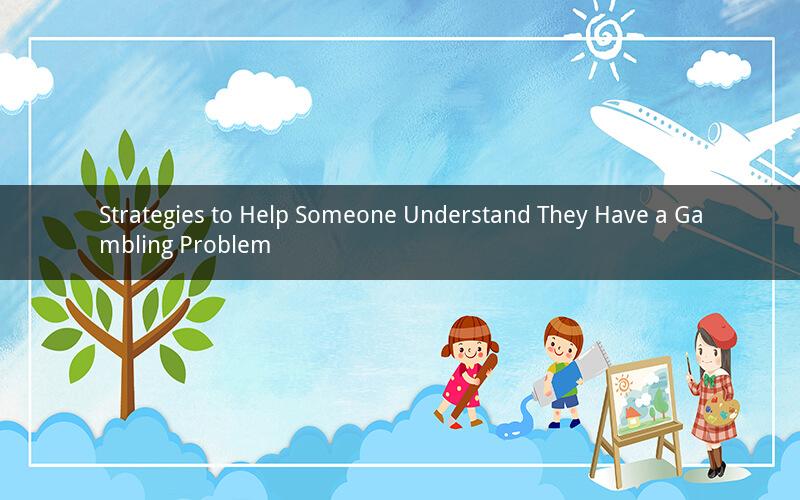
Introduction:
Gambling addiction is a serious issue that affects millions of people worldwide. Recognizing and acknowledging the presence of a gambling problem is the first step towards recovery. This article explores various strategies to help someone realize they have a gambling problem and encourages them to seek help.
1. Open and Honest Communication:
Creating a safe and supportive environment is crucial when discussing gambling addiction. Here are some tips for effective communication:
a. Choose the right time and place: Find a quiet and private setting where the person feels comfortable opening up.
b. Use "I" statements: Express your concerns without placing blame. For example, "I am worried about your gambling habits" instead of "You are a problem gambler."
c. Listen actively: Pay attention to the person's feelings and thoughts without interrupting. Show empathy and understanding.
d. Avoid confrontational language: Use gentle and non-accusatory language to avoid causing defensiveness.
2. Educate About the Signs of Gambling Addiction:
Provide the person with information about the signs and symptoms of gambling addiction. Some common signs include:
a. Preoccupation with gambling: Constantly thinking about gambling, planning for future gambling sessions, or reliving past gambling experiences.
b. Lying or hiding: Concealing gambling activities from family and friends, or lying about the amount of money spent on gambling.
c. Risky behavior: Taking increasingly risky bets or spending more money than intended.
d. Financial problems: Difficulty paying bills, accumulating debt, or borrowing money to fund gambling.
e. Relationship issues: Strained relationships with family, friends, or partners due to gambling.
f. Emotional and physical symptoms: Feelings of guilt, shame, anxiety, or depression, as well as physical symptoms like insomnia or headaches.
3. Encourage Professional Help:
Emphasize the importance of seeking professional help for gambling addiction. Here are some options:
a. Therapy: Cognitive-behavioral therapy (CBT) is an effective treatment for gambling addiction. A therapist can help the person develop healthier coping mechanisms and address underlying issues.
b. Support groups: Joining a support group like Gamblers Anonymous can provide a sense of community and understanding.
c. Inpatient or outpatient rehab: Depending on the severity of the addiction, inpatient or outpatient rehab programs can offer structured treatment and support.
4. Set Clear Boundaries and Expectations:
Establish clear boundaries and expectations to help the person take responsibility for their gambling behavior. Here are some suggestions:
a. Create a budget: Limit the amount of money the person can spend on gambling and monitor their spending.
b. Establish a "no-gambling" zone: Designate certain areas or times where gambling is not allowed.
c. Encourage alternative activities: Suggest healthy and productive activities that can replace gambling as a form of entertainment.
d. Monitor progress: Regularly check in on the person's progress and offer support along the way.
5. Be Patient and Supportive:
Recovery from gambling addiction is a long and challenging process. Here are some ways to provide ongoing support:
a. Encourage self-care: Encourage the person to prioritize their physical and mental well-being through exercise, proper nutrition, and sufficient sleep.
b. Offer empathy and understanding: Acknowledge the difficulties the person faces and provide emotional support.
c. Celebrate milestones: Recognize and celebrate the person's progress, no matter how small.
d. Maintain open communication: Keep the lines of communication open and be available to listen and provide support.
Frequently Asked Questions:
Q1: How can I tell if someone has a gambling problem?
A1: Look for signs such as preoccupation with gambling, lying about gambling activities, risky behavior, financial problems, relationship issues, and emotional or physical symptoms.
Q2: Is it possible for someone to recover from a gambling addiction?
A2: Yes, recovery from gambling addiction is possible with the right support, treatment, and commitment to change.
Q3: What should I do if I suspect someone close to me has a gambling problem?
A3: Start by expressing your concerns in a non-confrontational manner. Encourage them to seek professional help and offer your support throughout the process.
Q4: Can therapy help someone recover from a gambling addiction?
A4: Yes, therapy, especially cognitive-behavioral therapy (CBT), can be an effective treatment for gambling addiction. A therapist can help the person develop healthier coping mechanisms and address underlying issues.
Q5: How can I support someone who is struggling with a gambling addiction?
A5: Be patient, empathetic, and supportive. Encourage them to seek professional help, help set boundaries and expectations, and offer your presence and understanding throughout their recovery journey.